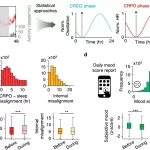In a world filled with diverse perspectives, it’s common to assume we understand the opinions of those around us, especially those who hold different views. However, a new study from the Institute of Psychiatry, Psychology & Neuroscience (IoPPN) at King’s College London, in collaboration with the University of Oxford, suggests that this confidence may be misplaced.
The Psychology of Misunderstanding
The study, recently published in Scientific Reports, explores the psychological mechanisms behind our tendency to overestimate our ability to understand others’ opinions. When we categorize and classify the world around us, we often create simplified versions of complex realities. While this helps us make sense of our environment, it can also lead to significant misunderstandings, particularly when it comes to interpreting the views of others.
Dr. Bryony Payne, a postdoctoral researcher at King’s IoPPN and the study’s first author, explains, “Our study shows that people have a good understanding of those who are similar to themselves, and their confidence in this understanding is well-placed. However, our understanding of people with different views to our own is demonstrably poor. The more confident we are that we can understand them, the more likely it is that we are wrong.”
The Study: A Closer Look
The research involved 256 participants from the United States, evenly split between those with left-leaning and right-leaning political orientations. Participants were asked to rate various political statements on a 5-point scale, ranging from strong agreement to strong disagreement. They were then shown another person’s response to the same statement, with the other person being categorized as either part of the participant’s “in-group” (sharing similar views) or “out-group” (holding differing opinions).
The findings were striking. When participants shared similar views, they accurately predicted the other person’s response and were justifiably confident in their predictions. However, when faced with differing viewpoints, their confidence often did not match the accuracy of their predictions, even when additional information about the other person was provided.
Real-World Implications
These misunderstandings have serious consequences, extending beyond personal interactions and into broader societal issues. Dr. Payne notes, “There are clear consequences to this lack of awareness, and we have seen countless real-world examples.” One such example is the recent riots in the UK, which were fueled by a small group of individuals likely confident in their (mis)understanding of the views and beliefs of Muslims and asylum seekers.
Misconceptions like these are often amplified by disinformation on social media and reinforced within echo chambers of like-minded individuals. This creates a cycle where misunderstandings are not only perpetuated but also intensified.
The Path to Understanding
Despite the challenges, the study offers a hopeful message: we are capable of change. Dr. Caroline Catmur, a Reader in Cognitive Psychology at King’s IoPPN and the study’s senior author, suggests that engaging with a more diverse group of people and having direct conversations with those who hold different beliefs can help us challenge our incorrect assumptions.
“While there is no quick fix in a real-world setting, if everyone interacted with a more diverse group of people, talked directly to them, and got to know them, it’s likely we would understand each other better,” says Dr. Catmur.
Ultimately, the key to bridging these gaps lies in genuine connection and a willingness to challenge our own assumptions. By moving beyond oversimplified labels and truly listening to others, we can foster a more empathetic and understanding society.
Next time you believe you grasp someone else’s perspective, take a moment to pause. Our brains naturally want to categorize things, but it’s crucial to push past these simplifications. Only by doing so can we contribute to a more connected and harmonious world.










